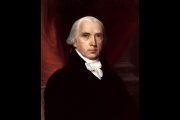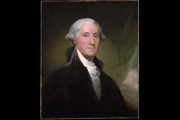If it is true that a person’s character can be judged as precisely by the enemies he earns as by the friends he makes, the character of former FBI Director J. Edgar Hoover must be rated high indeed. Hoover ran the agency for nearly 48 years prior to his death on May 2, 1972. When he became director in 1924, it was called the Bureau of Investigation and (as described by The Facts On File Encyclopedia of the 20th Century) “was inefficient and scandal-ridden.” But “Hoover quickly turned it into a crack policing agency, doing away with political appointments and recruiting improved staff, establishing centralized fingerprint and statistical files, developing a crime laboratory and founding a training academy.”
During his long and distinguished career of public service, Director Hoover received three presidential awards, sundry citations by Congress, and following his death was the first civil servant in U.S. history to lie in state in the Rotunda of the U.S. Capitol.
Yet more than two decades later, Hoover’s detractors on the Left continue an aggressive campaign to denigrate his reputation and record.
Frontline Fabrications
On February 9, the Public Broadcasting Service (PBS) program Frontline sought to show that Hoover was personally corrupt, addicted to gambling, had ties to oganized crime due to that addiction, and was being blackmailed by mobsters possessing a photograph showing him in a compromising sexual situation with a male friend.* Hoover was a lifelong bachelor, sparking rumors that he was homosexual or bisexual. Though accompanied and assisted in his travels around the country by FBI agents specially trained as investigators, the rumors were never substantiated and to this day remain mere gossip.
One Frontline scenario had Hoover going easy on organized crime prior to 1961 due to his fear that the alleged compromising photograph would be made public. According to this thesis, it was not until Attorney General Robert Kennedy took control of the Justice Department in 1961, and began forcing Hoover’s hand, that effective measures were taken against organized crime.
Needless to say, the seedy snapshot has never been produced. Former FBI official Wannall asks why, if “there were such a photograph with which to blackmail Hoover,” was it not used “from 1961 to 1972 when 10 Cosa Nostra ‘family bosses’ were arrested and convicted, when organized crime convictions based on his investigations totaled 131 in 1965, 281 in 1968, and escalated to 813 the last year of his life?”
A lurid photograph is hardly required to explain Hoover’s pre-1961 record on organized crime. As Ben Fulton, chairman of the Washington, D.C., chapter of the Society of Former Special Agents of the FBI, noted in a letter to the Washington Times for February 18, 1993, “Until 1961, there was no federal law authorizing or enabling the FBI to investigate organized criminal activities or groups such as the Mafia.” The Interstate Transportation in Aid of Racketeering law passed by Congress that year granted such authority. But as Wannall reminds us, after local authorities raided the 1957 meeting of Mafia chieftains from across the United States in Appalachia, New York, “Hoover instituted a Top Hoodlum program. Several organized crime figures were nailed — long before Congressional approval of the 1961 statute — under individual laws [already] on the books….”
States’ Rights
Consistent with his basic conservative philosophy, J. Edgar Hoover believed that crime-related problems were best solved at the state and local — rather than federal — levels. The Frontline program, for instance, included an old film clip in which Hoover testified that “organized gambling is a vicious evil. It corrupts our youth and blights the lives of our adults. It becomes a springboard for other crimes: embezzlement, robbery, and even murder. But like any other type of crime, it can be controlled. In my opinion, the basic answer is an aroused public opinion which will act on a local [his emphasis] level through local law enforcement authorities to wipe out the menace.”
Similarly, when there was a move in Congress to make him commander of a powerful nationalized police system, he rejected the idea and testified against it. And during an interview with U.S. News & World Report (December 21, 1964), he reiterated: “I recently made the statement that I am inclined toward being a States’ righter in matters involving law enforcement. That is, I fully respect the sovereignty of State and local authorities. I consider the local police officer to be our first line of defense against crime, and I am opposed to a national police force…. The need is for effective local action, and this should begin with whole-hearted support of honest, efficient, local law enforcement.”
Likewise, Hoover’s view of gun control included his belief that the “numerous facets and ramifications of gun control are so varied and complex that regulatory measures must be at State and local levels. It is only at these levels that effective enforcement efforts can be undertaken. Many communities already have local ordinances which protect the rights of society without infringing on the rights of individuals who purchase guns for protection or legitimate recreation and pleasure.”
Hoover’s position stands in sharp contrast to that recently expressed by FBI Director William Sessions in a letter to Attorney General Janet Reno recommending that the Justice Department endorse new federal gun control laws, including the controversial Brady waiting-period bill.
Déjà Vu
Without hard evidence, the recent attacks against J. Edgar Hoover deserve no more credence than similar despicable incidents that transpired during Hoover’s last few years as director. In 1969, for instance, it became public knowledge that in the early 1960s an FBI wiretap had been placed on Dr. Martin Luther King Jr.’s telephone. When Hoover explained that Attorney General Robert Kennedy had not only authorized, but had proposed, the tap, another former attorney general, Ramsey Clark, angrily told reporters that Hoover was being “false” and “deceptive,” and called for his retirement. When the smoke cleared, however, Hoover had proved with documents from his files that Kennedy had indeed both instigated and authorized the King wiretap. A chagrined Clark refused to apologize.
On November 18, 1970, the Washington Post reported on a press conference held by Ramsey Clark in New York. Both during and after the conference, Clark attacked Hoover, alleging (among other things) that FBI observation of the Communist Party was “an illustration of the terribly wasteful use of resources” resulting from Hoover’s outmoded views. Clark’s allegation carried a twist of irony since he spoke under the auspices of an outfit called the Committee for Public Justice, of which he was an executive council member. The principal organizer of the committee was playwright Lillian Hellman. She told reporters at the press conference that the idea for the committee had come to her a few months earlier because “some of us thought we heard the voice of Joe McCarthy coming from the grave.” Two days later, Senator Strom Thurmond (R-S.C.) entered into the Congressional Record detailed information about Hellman, including a memorandum listing “nearly 100 Communist and leftist front organizations with which Miss Hellman has publicly been associated, as cited in official documents of the U.S. Congress.” The senator noted that “there is sworn testimony before a congressional committee which indicates that she was known as a member of the Communist Party during this period [the 1930s and 1940s]. She refused to testify with regard to these sworn statements, claiming privilege under the fifth amendment.”
It is interesting to note that, although Ramsey Clark ferociously attacked Hoover after leaving office in 1969, he had effused at a luncheon of the Society of Former Special Agents of the FBI on September 28, 1967: “Of all the agencies that could have reached this level of excellence the American people can be grateful that it was the FBI because of the dependence of our people upon its performance for both their personal security and their liberty. Of all the attributes of the excellence demonstrated by the FBI, perhaps none is more impressive than the balance that is always shown. Here, contrary to expectation, perhaps to many’s evaluation of human nature, there is no quest for empire…. [T]o a degree that I do not know to exist in any other institution, public or private, in this country, the great Bureau of Investigation is the lengthened shadow of John Edgar Hoover.”
The Shaw Affair
Jack Shaw, an FBI special agent with seven years of service, was attending (at FBI expense) the John Jay College of Criminal Justice in New York when, at the conclusion of one course, he decided to send his professor a lengthy letter evaluating the FBI. He completed a draft of the 16-page letter in mid-September 1970, and turned it over to the FBI’s typing pool in New York for final typing. Shaw’s superiors within the Bureau learned of the letter when a few pages were found in a wastebasket. Since it contained numerous remarks critical of both the Bureau and Director Hoover, Shaw was asked to supply the entire letter, which he refused to do, claiming academic freedom and declaring that he was entitled to the privacy of his thoughts. His superiors contended that a letter about the FBI, written by an FBI agent while attending an FBI-financed course, and which was typed during FBI time by an FBI secretary on an FBI typewriter, was properly FBI business.
Shaw not only refused to supply a complete copy of his letter, but told his superiors he had decided not to mail it and had destroyed it. It was subsequently learned, however, that the professor had indeed received a copy, which meant that Shaw was not only guilty of insubordination in refusing to give the letter to his superiors, but had lied about the matter. As a result, he was reprimanded and transferred to another FBI office. He refused the transfer and resigned.
In January 1971, the American Civil Liberties Union filed suit on Shaw’s behalf, charging Hoover with a “vindictive act of personal retribution.” At about that same time, Senator George McGovern (D-S.D.) attacked Hoover over the Shaw issue, then took the Senate floor on February 10, 1971 to urge that Hoover be cited for contempt of Congress on grounds that he had supplied information about the Shaw case to a newspaper, but had refused to supply it to a Senate committee chaired by Senator Edward Kennedy (D-Mass.). Kennedy had written to Hoover requesting information, but Hoover had replied that he had been advised by the attorney general “that since the courts have assumed jurisdiction of this matter, it would not be appropriate for me to use any other forum to contest Mr. Shaw’s charges.”
Five days later, however, a letter from Hoover was published by the Atlanta Journal and Constitution, giving in some detail the FBI’s position on the matter. That is what led Senator McGovern to claim that Hoover was in contempt of Congress. But as was so often the case during his congressional career, McGovern did not know what he was talking about. Here is the pertinent chronology:
• Director Hoover’s letter to the newspaper was sent on January 26, the day before Shaw’s lawsuit was filed.
• Shortly thereafter, Attorney General John Mitchell advised Hoover to reserve his comments on the Shaw matter for the courts.
• Senator Kennedy’s letter to Hoover was sent on January 29.
• Hoover replied to Senator Kennedy on February 2, explaining the position of the attorney general.
• The newspaper did not publish Hoover’s January 26th letter until February 7, which was hardly Hoover’s fault.
Hoover’s conduct was entirely proper, yet Senator McGovern, even when apprised of the facts, declined either to retract or modify his false and intemperate accusations.
Another incident involving McGovern occurred on March 1, 1971, when he attacked Hoover on the basis of an anonymous letter on FBI stationery purportedly written on behalf of ten of the FBI’s special agents. The letter, dated February 2, 1971, contained information that, if authentic, supported the charges which Jack Shaw had made regarding Hoover’s leadership of the FBI.
But the intrinsic nature of the letter clearly indicated that it was a forgery, and McGovern was never able to present hard proof of its authenticity. For one thing, the grammar throughout would have put a high school sophomore to shame, which is significant when one recalls that special agents are required to have college degrees in either law or accounting. The letter also contained a number of simple misstatements of fact, the truth of which would have been known by anyone serving as a special agent. For instance, it alleged that FBI statistical accomplishments are reported in the F.B.I. Uniform Crime Reports, when such Reports are in fact compilations of data voluntarily submitted by municipal, county, and state law enforcement agencies.
In short, McGovern had used an anonymous, error-ridden, bogus letter as the basis for his anti-Hoover tirade.
“Tap” Dancing
The February 9 Frontline program claimed at one point that Hoover “even tapped into the main telephone cable on Capitol Hill.” No evidence was given to substantiate the charge, though it may have been based on a widely publicized claim years earlier by another ultra-liberal member of Congress.
On April 5, 1971, just after the House had been called to order, Majority Leader Hale Boggs (D-La.) asked to be heard. Boggs proceeded, among other things, to accuse the FBI of tapping the telephones of members of Congress. He, too, called for Director Hoover’s resignation, yet he gave no proof whatsoever to support his charges, and the Justice Department asserted emphatically that the “FBI has not tapped the telephones of any member of the House or Senate now or in the past.” Boggs nevertheless claimed that he had reams of “proof,” and would make it public following the Easter recess. On April 22, during an hour-long House speech, he presented his “proof.” It was an incredible performance.
Boggs claimed that a Chesapeake and Potomac Telephone Company investigator had, at his request, inspected the telephone lines at his residence during the previous summer and had told him a tap had been placed on the line, but that it had been removed prior to the inspection. The problem, however, was that there was simply no way for anyone to tell whether a phone had been tapped once the tapping mechanism was removed. Boggs himself admitted that an official report received from the telephone company regarding the matter had told him categorically that “there was no tap on my lines.” Incredibly, he then claimed that this supported his contention that the FBI had tapped his phone, because he had learned it is a policy of the phone company to deny the existence of taps if they are placed by the FBI!
The telephone company, however, had no such policy. Following Boggs’ speech, a company spokesman said: “When we discover a wiretap it is our practice to inform both the customer and the appropriate law enforcement authorities. There are no exceptions made for the FBI.” He also made clear that, in the case of Boggs’ phone, “No wiretapping was found, nor was there any evidence of any previous tap.”
High Standards
The Saturday Evening Post once observed that, whereas “other agencies have suffered through their scandals … there has never [during the Hoover years] been a known case of influence-selling or bribe-taking in the F.B.I.” An indication of the standards which J. Edgar Hoover attempted to maintain was the firing of an FBI clerk after it was learned that he had allowed a “girlfriend” to stay overnight in his apartment.
Hoover was censured by his leftist critics, but an FBI spokesman noted at the time that “Bureau employees know we have high standards of conduct here. They could reflect discredit upon the bureau.” Those high standards were apparently responsible, in part, for the relatively high employee turnover within the Bureau. As explained by the New York Times for April 24, 1966, many young clerks “come to Washington to escape hometown social mores …. When they find the F.B.I. is just like home … many drift into other Government agencies, where at least the social values of home can be left behind.”
J. Edgar Hoover had, and obviously still has, the right enemies. They continue to stand, in their own peculiar way, as a special tribute to his character, his patriotism, and those “social values of home” which he espoused.
* The flimsy “evidence” in support of such serious charges, as summarized by former FBI Intelligence Division Assistant Director W. Raymond Wannall, emanated from “dead witnesses, a perjurer, a Watergate burglar, and principally a British author, Anthony Summers, whose allegations against a previous American public servant, repeated in a London newspaper, resulted in an open-court retraction, apology and payment of a substantial sum in damages.” Summers, who was a consultant for the Frontline program, is author of Official and Confidential: The Secret Life of J. Edgar Hoover, on which the program was largely based. In his earlier book Conspiracy, he charged that CIA official David Atlee Phillips had been involved in the assassination of President John F. Kennedy. The British newspaper The Observer published excerpts from the book, Phillips sued, and The Observer admitted in open court that “there was never any evidence” to support Summers’ allegations. The paper apologized to Phillips and paid £22,500 in damages.



